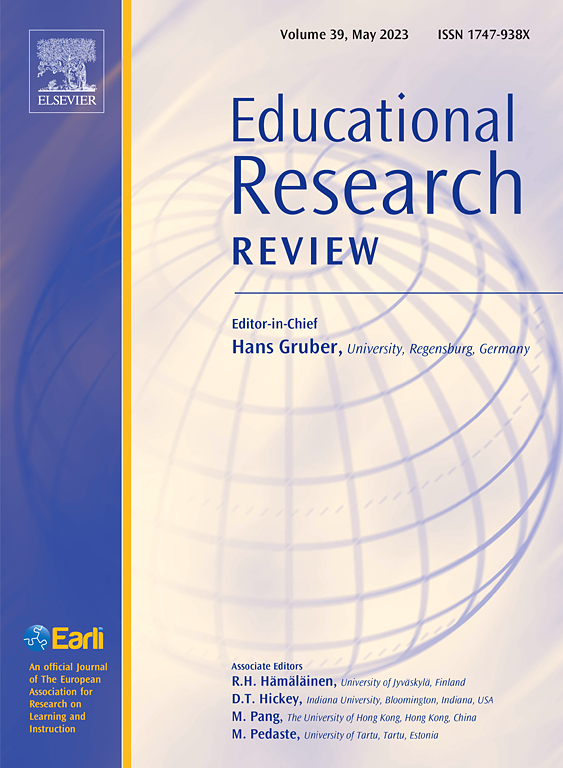Aligning interventions with the University Mental Health Charter: A stratified review of reviews of mental health and wellbeing interventions for higher education students
IF 10.6
1区 教育学
Q1 EDUCATION & EDUCATIONAL RESEARCH
引用次数: 0
Abstract
This stratified review of reviews evaluates the alignment of mental health and wellbeing interventions for higher education students within the University Mental Health Charter's domains. A narrative synthesis of 341 studies was conducted, extracted from 265 reviews. Interventions were stratified by the Mental Health Charter's domains—Live, Learn, and Support—and analysed for their impact on mental health outcomes. The “Live” domain, particularly proactive interventions and mentally healthy environments, had the highest number of studies, predominantly conducted via Randomised Controlled Trials. The “Learn” domain largely comprised quasi-experimental studies, while the “Support” domain featured pre-post designs without control groups. Interventions were primarily conducted in person and were universal, targeting undergraduate students, with North America being the most frequent research location. For the most frequent mental health outcomes (anxiety, depression, and stress), interventions showed mixed effectiveness across all domains, with no significant association between the type of intervention and its impact. Most studies were rated as having medium evidence strength, with less than 10 % classified as strong evidence. The findings highlight a critical need for diversified research focusing on underrepresented areas within the Mental Health Charter, such as academic progression and partnerships with external care providers. Additionally, there is a call for standardised outcome measures to enhance the robustness of future meta-analyses and the overall evidence quality. Addressing these gaps will support the effective implementation of a whole-university approach to student mental health.
使干预措施与《大学心理健康宪章》相一致:对高等教育学生心理健康和福祉干预措施审查的分层审查
这一分层综述评估了大学心理健康宪章范围内高等教育学生的心理健康和福祉干预措施的一致性。从265篇综述中提取了341项研究,进行了叙述性综合。根据《精神健康宪章》的领域——生活、学习和支持——对干预措施进行分层,并分析其对精神健康结果的影响。“生活”领域,特别是主动干预和心理健康环境,研究数量最多,主要是通过随机对照试验进行的。“学习”领域主要由准实验研究组成,而“支持”领域的特点是没有对照组的前后设计。干预措施主要是亲自进行的,并且是普遍的,针对本科生,北美是最常见的研究地点。对于最常见的心理健康结果(焦虑、抑郁和压力),干预措施在所有领域都显示出混合效果,干预类型与其影响之间没有显著关联。大多数研究被评为具有中等证据强度,不到10%的研究被列为强证据。研究结果强调,迫切需要对《精神卫生宪章》中代表性不足的领域进行多样化的研究,例如学术进步和与外部护理提供者的合作关系。此外,还需要标准化的结果测量,以提高未来meta分析的稳健性和整体证据质量。解决这些差距将有助于有效实施整个大学的学生心理健康方法。
本文章由计算机程序翻译,如有差异,请以英文原文为准。
求助全文
约1分钟内获得全文
求助全文
来源期刊

Educational Research Review
EDUCATION & EDUCATIONAL RESEARCH-
CiteScore
19.40
自引率
0.90%
发文量
53
审稿时长
57 days
期刊介绍:
Educational Research Review is an international journal catering to researchers and diverse agencies keen on reviewing studies and theoretical papers in education at any level. The journal welcomes high-quality articles that address educational research problems through a review approach, encompassing thematic or methodological reviews and meta-analyses. With an inclusive scope, the journal does not limit itself to any specific age range and invites articles across various settings where learning and education take place, such as schools, corporate training, and both formal and informal educational environments.
 求助内容:
求助内容: 应助结果提醒方式:
应助结果提醒方式:


